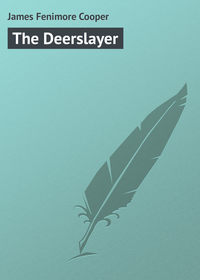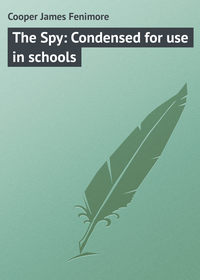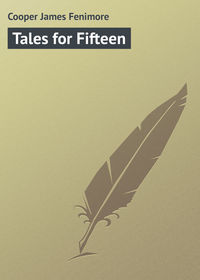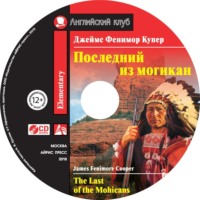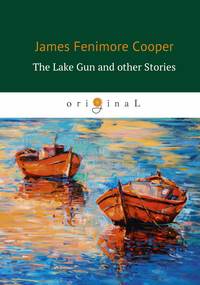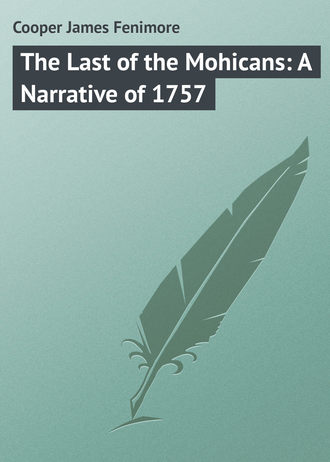 полная версия
полная версияThe Last of the Mohicans: A Narrative of 1757
"The lad will be an honor to his people," said Hawkeye, regarding the trail with as much admiration as a naturalist would expend on the tusk of a mammoth or the rib of a mastodon; "ay, and a thorn in the sides of the Hurons. Yet that is not the footstep of an Indian! the weight is too much on the heel, and the toes are squared, as though one of the French dancers had been in, pigeon-winging his tribe! Run back, Uncas, and bring me the size of the singer's foot. You will find a beautiful print of it just opposite yon rock, agin the hillside."
While the youth was engaged in this commission, the scout and Chingachgook were attentively considering the impressions. The measurements agreed, and the former unhesitatingly pronounced that the footstep was that of David, who had once more, been made to exchange his shoes for moccasins.
"I can now read the whole of it, as plainly as if I had seen the arts of Le Subtil," he added; "the singer, being a man whose gifts lay chiefly in his throat and feet, was made to go first, and the others have trod in his steps, imitating their formation."
"But," cried Duncan, "I see no signs of – "
"The gentle ones," interrupted the scout; "the varlet has found a way to carry them, until he supposed he had thrown any followers off the scent. My life on it, we see their pretty little feet again, before many rods go by."
The whole party now proceeded, following the course of the rill, keeping anxious eyes on the regular impressions. The water soon flowed into its bed again, but watching the ground on either side, the foresters pursued their way content with knowing that the trail lay beneath. More than half a mile was passed, before the rill rippled close around the base of an extensive and dry rock. Here they paused to make sure that the Hurons had not quitted the water.
It was fortunate they did so. For the quick and active Uncas soon found the impression of a foot on a bunch of moss, where it would seem an Indian had inadvertently trodden. Pursuing the direction given by this discovery, he entered the neighboring thicket, and struck the trail, as fresh and obvious as it had been before they reached the spring. Another shout announced the good fortune of the youth to his companions, and at once terminated the search.
"Ay, it has been planned with Indian judgment," said the scout, when the party was assembled around the place; "and would have blinded white eyes."
"Shall we proceed?" demanded Heyward.
"Softly, softly: we know our path; but it is good to examine the formation of things. This is my schooling, major; and if one neglects the book, there is little chance of learning from the open hand of Providence. All is plain but one thing, which is the manner that the knave contrived to get the gentle ones along the blind trail. Even a Huron would be too proud to let their tender feet touch the water."
"Will this assist in explaining the difficulty?" said Heyward, pointing towards the fragments of a sort of handbarrow, that had been rudely constructed of boughs, and bound together with withes, and which now seemed carelessly cast aside as useless.
"'Tis explained!" cried the delighted Hawkeye. "If them varlets have passed a minute, they have spent hours in striving to fabricate a lying end to their trail! Well, I've known them to waste a day in the same manner, to as little purpose. Here we have three pair of moccasins, and two of little feet. It is amazing that any mortal beings can journey on limbs so small! Pass me the thong of buckskin, Uncas, and let me take the length of this foot. By the Lord, it is no longer than a child's and yet the maidens are tall and comely. That Providence is partial in its gifts, for its own wise reasons, the best and most contented of us must allow."
"The tender limbs of my daughters are unequal to these hardships," said Munro, looking at the light footsteps of his children, with a parent's love: "we shall find their fainting forms in this desert."
"Of that there is little cause of fear," returned the scout, slowly shaking his head; "this is a firm and straight, though a light step, and not over long. See, the heel has hardly touched the ground; and there the dark-hair has made a little jump, from root to root. No, no; my knowledge for it, neither of them was nigh fainting, hereaway. Now, the singer was beginning to be foot-sore and leg-weary as is plain by his trail. There, you see, he slipped; here he has travelled wide, and tottered; and there, again, it looks as though he journeyed on snow-shoes. Ay, ay, a man who uses his throat altogether, can hardly give his legs a proper training."
From such undeniable testimony did the practised woodsman arrive at the truth, with nearly as much certainty and precision as if he had been a witness of all those events which his ingenuity so easily elucidated. Cheered by these assurances, and satisfied by a reasoning that was so obvious, while it was so simple, the party resumed its course, after making a short halt to take a hurried repast.
When the meal was ended, the scout cast a glance upwards at the setting sun, and pushed forward with a rapidity which compelled Heyward and the still vigorous Munro to exert all their muscles to equal. Their route now lay along the bottom which had already been mentioned. As the Hurons had made no further efforts to conceal their footsteps, the progress of the pursuers was no longer delayed by uncertainty. Before an hour had elapsed, however, the speed of Hawkeye sensibly abated, and his head, instead of maintaining its former direct and forward look, began to turn suspiciously from side to side, as if he were conscious of approaching danger. He soon stopped again, and waited for the whole party to come up.
"I scent the Hurons," he said, speaking to the Mohicans; "yonder is open sky, through the tree-tops, and we are getting too nigh their encampment. Sagamore, you will take the hillside, to the right; Uncas will bend along the brook to the left, while I will try the trail. If anything should happen, the call will be three croaks of a crow. I saw one of the birds fanning himself in the air, just beyond the dead oak – another sign that we are touching an encampment."
The Indians departed their several ways without reply, while Hawkeye cautiously proceeded with the two gentlemen. Heyward soon pressed to the side of their guide, eager to catch an early glimpse of those enemies he had pursued with so much toil and anxiety. His companion told him to steal to the edge of the wood, which, as usual, was fringed with a thicket, and wait his coming, for he wished to examine certain suspicious signs a little on one side. Duncan obeyed, and soon found himself in a situation to command a view which he found as extraordinary as it was novel.
The trees of many acres had been felled, and the glow of a mild summer's evening had fallen on the clearing, in beautiful contrast to the gray light of the forest. A short distance from the place where Duncan stood, the stream had seemingly expanded into a little lake, covering most of the low land, from mountain to mountain. The water fell out of this wide basin, in a cataract so regular and gentle, that it appeared rather to be the work of human hands, than fashioned by nature. A hundred earthen dwellings stood on the margin of the lake, and even in its water, as though the latter had overflowed its usual banks. Their rounded roofs, admirably moulded for defence against the weather, denoted more of industry and foresight than the natives were wont to bestow on their regular habitations, much less on those they occupied for the temporary purposes of hunting and war. In short, the whole village or town, whichever it might be termed, possessed more of method and neatness of execution, than the white men had been accustomed to believe belonged, ordinarily, to the Indian habits. It appeared, however, to be deserted. At least, so thought Duncan for many minutes; but, at length, he fancied he discovered several human forms advancing towards him on all fours, and apparently dragging in their train some heavy, and as he was quick to apprehend, some formidable engine. Just then a few dark looking heads gleamed out of the dwellings, and the place seemed suddenly alive with beings, which, however, glided from cover to cover so swiftly, as to allow no opportunity of examining their humors or pursuits. Alarmed at these suspicious and inexplicable movements, he was about to attempt the signal of the crows, when the rustling of leaves at hand drew his eyes in another direction.
The young man started, and recoiled a few paces instinctively, when he found himself within a hundred yards of a stranger Indian. Recovering his recollection on the instant, instead of sounding an alarm, which might prove fatal to himself, he remained stationary, an attentive observer of the other's motions.
An instant of calm observation served to assure Duncan that he was undiscovered. The native, like himself, seemed occupied in considering the low dwellings of the village, and the stolen movements of its inhabitants. It was impossible to discover the expression of his features, through the grotesque mask of paint under which they were concealed; though Duncan fancied it was rather melancholy than savage. His head was shaved, as usual, with the exception of the crown, from whose tuft three or four faded feathers from a hawk's wing were loosely dangling. A ragged calico mantle half-encircled his body, while his nether garment was composed of an ordinary shirt, the sleeves of which were made to perform the office that is usually executed by a much more commodious arrangement. His legs were bare, and sadly cut and torn by briers. The feet were, however, covered with a pair of good deer-skin moccasins. Altogether, the appearance of the individual was forlorn and miserable.
Duncan was still curiously observing the person of his neighbor, when the scout stole silently and cautiously to his side.
"You see we have reached their settlement or encampment," whispered the young man; "and here is one of the savages himself, in a very embarrassing position for our further movements."
Hawkeye started, and dropped his rifle, directed by the finger of his companion, the stranger came under his view. Then lowering the dangerous muzzle, he stretched forward his long neck, as if to assist a scrutiny that was already intensely keen.
"The imp is not a Huron," he said, "nor of any of the Canada tribes; and yet you see, by his clothes, the knave has been plundering a white. Ay, Montcalm has raked the woods for his inroad, and a whooping, murdering set of varlets has he gathered together. Can you see where he has put his rifle or his bow?"
"He appears to have no arms; nor does he seem to be viciously inclined. Unless he communicate the alarm to his fellows, who as you see are dodging about the water, we have but little to fear from him."
The scout turned to Heyward, and regarded him a moment with unconcealed amazement. Then opening wide his mouth, he indulged in unrestrained and heartfelt laughter, though in that silent and peculiar manner which danger had so long taught him to practise.
Repeating the words, "fellows who are dodging about the water!" he added, "so much for schooling and passing a boyhood in the settlements! The knave has long legs, though, and shall not be trusted. Do you keep him under your rifle while I creep in behind, through the bush, and take him alive. Fire on no account."
Heyward had already permitted his companion to bury part of his person in the thicket, when, stretching forth an arm, he arrested him, in order to ask, —
"If I see you in danger, may I not risk a shot?"
Hawkeye regarded him a moment, like one who knew not how to take the question; then nodding his head, he answered, still laughing, though inaudibly, —
"Fire a whole platoon, major."
In the next moment he was concealed by the leaves. Duncan waited several minutes in feverish impatience, before he caught another glimpse of the scout. Then he reappeared, creeping along the earth, from which his dress was hardly distinguishable, directly in the rear of his intended captive. Having reached within a few yards of the latter, he arose to his feet, silently and slowly. At that instant, several loud blows were struck on the water, and Duncan turned his eyes just in time to perceive that a hundred dark forms were plunging, in a body, into the troubled little sheet. Grasping his rifle, his looks were again bent on the Indian near him. Instead of taking the alarm, the unconscious savage stretched forward his neck, as if he also watched the movements about the gloomy lake, with a sort of silly curiosity. In the meantime, the uplifted hand of Hawkeye was above him. But, without any apparent reason, it was withdrawn, and its owner indulged in another long, though still silent, fit of merriment. When the peculiar and hearty laughter of Hawkeye was ended, instead of grasping his victim by the throat, he tapped him lightly on the shoulder, and exclaimed aloud, —
"How now, friend! have you a mind to teach the beavers to sing?"
"Even so," was the ready answer. "It would seem that the Being that gave them power to improve his gifts so well, would not deny them voices to proclaim his praise."
CHAPTER XXII
"Bot.– Are we all met?""Qui.– Pat – pat; and here's a marvellous Convenient place for our rehearsal."Midsummer Night's Dream.The reader may better imagine, than we describe, the surprise of Heyward. His lurking Indians were suddenly converted into four-footed beasts; his lake into a beaver pond; his cataract into a dam, constructed by those industrious and ingenious quadrupeds; and a suspected enemy into his tried friend, David Gamut, the master of psalmody. The presence of the latter created so many unexpected hopes relative to the sisters that, without a moment's hesitation, the young man broke out of his ambush, and sprang forward to join the two principal actors in the scene.
The merriment of Hawkeye was not easily appeased. Without ceremony, and with a rough hand, he twirled the supple Gamut around on his heel, and more than once affirmed that the Hurons had done themselves great credit in the fashion of his costume. Then seizing the hand of the other, he squeezed it with a gripe that brought the tears into the eyes of the placid David, and wished him joy of his new condition.
"You were about opening your throat-practysings among the beavers, were ye?" he said. "The cunning devils know half the trade already, for they beat the time with their tails, as you heard just now; and in good time it was too, or 'Killdeer' might have sounded the first note among them. I have known greater fools, who could read and write, than an experienced old beaver; but as for squalling, the animals are born dumb! What think you of such a song as this?"
David shut his sensitive ears, and even Heyward, apprised as he was of the nature of the cry, looked upwards in quest of the bird, as the cawing of a crow rang in the air about them.
"See!" continued the laughing scout, as he pointed towards the remainder of the party, who, in obedience to the signal, were already approaching: "this is music which has its natural virtues; it brings two good rifles to my elbow, to say nothing of the knives and tomahawks. But we see that you are safe; now tell us what has become of the maidens."
"They are captives to the heathen," said David; "and though greatly troubled in spirit, enjoying comfort and safety in the body."
"Both?" demanded the breathless Heyward.
"Even so. Though our wayfaring has been sore and our sustenance scanty, we have had little other cause for complaint, except the violence done our feelings, by being thus led in captivity into a far land."
"Bless ye for these very words!" exclaimed the trembling Munro; "I shall then receive my babes spotless and angel-like, as I lost them!"
"I know not that their delivery is at hand," returned the doubting David; "the leader of these savages is possessed of an evil spirit that no power short of Omnipotence can tame. I have tried him sleeping and waking, but neither sounds nor language seem to touch his soul."
"Where is the knave?" bluntly interrupted the scout.
"He hunts the moose to-day, with his young men; and to-morrow, as I hear, they pass farther into these forests, and nigher to the borders of Canada. The elder maiden is conveyed to a neighboring people, whose lodges are situate beyond yonder black pinnacle of rock; while the younger is detained among the women of the Hurons, whose dwellings are but two short miles hence, on a table-land, where the fire has done the office of the axe, and prepared the place for their reception."
"Alice, my gentle Alice!" murmured Heyward; "she has lost the consolation of her sister's presence!"
"Even so. But so far as praise and thanksgiving in psalmody can temper the spirit in affliction, she has not suffered."
"Has she then a heart for music?"
"Of the graver and more solemn character; though it must be acknowledged that, in spite of all my endeavors, the maiden weeps oftener than she smiles. At such moments I forbear to press the holy songs; but there are many sweet and comfortable periods of satisfactory communication, when the ears of the savages are astounded with the upliftings of our voices."
"And why are you permitted to go at large, unwatched?"
David composed his features into what he intended should express an air of modest humility, before he meekly replied —
"Little be the praise to such a worm as I. But, though the power of psalmody was suspended in the terrible business of that field of blood through which we passed, it has recovered its influence even over the souls of the heathen, and I am suffered to go and come at will."
The scout laughed, and tapping his own forehead significantly, he perhaps explained the singular indulgence more satisfactorily when he said —
"The Indians never harm a non-composser. But why, when the path lay open before your eyes, did you not strike back on your own trail (it is not so blind as that which a squirrel would make), and bring in the tidings to Edward?"
The scout, remembering only his own sturdy and iron nature, had probably exacted a task that David, under no circumstances, could have performed. But, without entirely losing the meekness of his air, the latter was content to answer —
"Though my soul would rejoice to visit the habitations of Christendom once more, my feet would rather follow the tender spirits intrusted to my keeping, even into the idolatrous province of the Jesuits, than take one step backward, while they pined in captivity and sorrow."
Though the figurative language of David was not very intelligible, the sincere and steady expression of his eye, and the glow on his honest countenance, were not easily mistaken. Uncas pressed closer to his side, and regarded the speaker with a look of commendation, while his father expressed his satisfaction by the ordinary pithy exclamation of approbation. The scout shook his head as he rejoined —
"The Lord never intended that the man should place all his endeavors in his throat, to the neglect of other and better gifts! But he has fallen into the hands of some silly woman, when he should have been gathering his education under a blue sky, among the beauties of the forest. Here, friend; I did intend to kindle a fire with this tooting whistle of thine; but as you value the thing, take it, and blow your best on it!"
Gamut received his pitch-pipe with as strong an expression of pleasure as he believed compatible with the grave functions he exercised. After essaying its virtues repeatedly, in contrast with his own voice, and satisfying himself that none of its melody was lost, he made a very serious demonstration towards achieving a few stanzas of one of the longest effusions in the little volume so often mentioned.
Heyward, however, hastily interrupted his pious purpose, by continuing questions concerning the past and present condition of his fellow-captives, and in a manner more methodical than had been permitted by his feelings in the opening of their interview. David, though he regarded his treasure with longing eyes, was constrained to answer: especially as the venerable father took a part in the interrogatories, with an interest too imposing to be denied. Nor did the scout fail to throw in a pertinent inquiry, whenever a fitting occasion presented. In this manner, though with frequent interruptions, which were filled with certain threatening sounds from the recovered instrument, the pursuers were put in possession of such leading circumstances as were likely to prove useful in accomplishing their great and engrossing object – the recovery of the sisters. The narrative of David was simple, and the facts but few.
Magua had waited on the mountain until a safe moment to retire presented itself, when he had descended, and taken the route along the western side of the Horican, in the direction of the Canadas. As the subtle Huron was familiar with the paths, and well knew there was no immediate danger of pursuit, their progress had been moderate, and far from fatiguing. It appeared from the unembellished statement of David, that his own presence had been rather endured than desired; though even Magua had not been entirely exempt from that veneration with which the Indians regard those whom the Great Spirit has visited in their intellects. At night, the utmost care had been taken of the captives, both to prevent injury from the damps of the woods, and to guard against an escape. At the spring, the horses were turned loose, as has been seen; and notwithstanding the remoteness and length of their trail, the artifices already named were resorted to, in order to cut off every clue to their place of retreat. On their arrival at the encampment of his people, Magua, in obedience to a policy seldom departed from, separated his prisoners. Cora had been sent to a tribe that temporarily occupied an adjacent valley, though David was too ignorant of the customs and history of the natives to be able to declare anything satisfactory concerning their name or character. He only knew that they had not engaged in the late expedition against William Henry; that, like the Hurons themselves, they were allies of Montcalm; and that they maintained an amicable, though a watchful intercourse with the warlike and savage people, whom chance had, for a time, brought in such close and disagreeable contact with themselves.
The Mohicans and the scout listened to his interrupted and imperfect narrative, with an interest that obviously increased as he proceeded; and it was while attempting to explain the pursuits of the community in which Cora was detained, that the latter abruptly demanded —
"Did you see the fashion of their knives? Were they of English or French formation?"
"My thoughts were bent on no such vanities, but rather mingled in consolation with those of the maidens."
"The time may come when you will not consider the knife of a savage such a despisable vanity," returned the scout, with a strong expression of contempt for the other's dulness. "Had they held their corn-feast – or can you say anything of the totems of the tribe?"
"Of corn, we had many and plentiful feasts; for the grain, being in the milk, is both sweet to the mouth and comfortable to the stomach. Of totem, I know not the meaning; but if it appertaineth in any wise to the art of Indian music, it need not be inquired after at their hands. They never join their voices in praise, and it would seem that they are among the profanest of the idolatrous."
"Therein you belie the nature of an Indian. Even the Mingo adores but the true and living God. 'Tis a wicked fabrication of the whites, and I say it to the shame of my color, that would make the warrior bow down before images of his own creation. It is true, they endeavor to make truces with the wicked one – as who would not with an enemy he cannot conquer! – but they look up for favor and assistance to the Great and Good Spirit only."
"It may be so," said David; "but I have seen strange and fantastic images drawn in their paint, of which their admiration and care savored of spiritual pride; especially one, and that, too, a foul and loathsome object."
"Was it a sarpent?" quickly demanded the scout.
"Much the same. It was in the likeness of an abject and creeping tortoise."
"Hugh!" exclaimed both the attentive Mohicans in a breath; while the scout shook his head with an air of one who had made an important, but by no means a pleasing discovery. Then the father spoke, in the language of the Delawares, and with a calmness and dignity that instantly arrested the attention even of those to whom his words were unintelligible. His gestures were impressive, and at times energetic. Once he lifted his arm on high; and as it descended, the action threw aside the folds of his light mantle, a finger resting on his breast, as if he would enforce his meaning by the attitude. Duncan's eyes followed the movement, and he perceived that the animal just mentioned was beautifully, though faintly, worked in a blue tint, on the swarthy breast of the chief. All that he had ever heard of the violent separation of the vast tribes of the Delawares rushed across his mind, and he awaited the proper moment to speak, with a suspense that was rendered nearly intolerable, by his interest in the stake. His wish, however, was anticipated by the scout, who turned from his red friend, saying —


